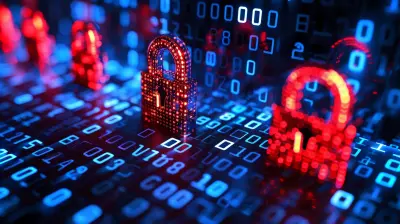25 December 2024
In today’s fast-paced digital world, everything from shopping to banking is done online. While the convenience is undeniable, it also opens the door to one of the most pressing concerns of our time: cybercrime. With cybercriminals becoming more advanced, protecting your financial data has never been more important.
If you’ve ever wondered, "How do I keep my personal financial information safe from hackers?" you’re not alone. But don't worry—I’ve got your back. In this article, we’ll break down practical, easy-to-follow tips that can help you protect your financial data from cybercriminals.

Why Is Your Financial Data a Prime Target?
Let’s be honest—your financial data is like the crown jewels of your personal information. It’s what cybercriminals are after because it holds real value. Think about it: with access to your bank details, credit card numbers, or even sensitive tax information, hackers can drain your accounts, open new lines of credit, or even steal your identity.It's not just about money either. Once cybercriminals get their hands on your data, they can use it for long-term exploitation, selling your information on the dark web or blackmailing you. Scary, right? But don’t panic—there are ways to keep your data safe from these digital thieves.

Common Threats to Your Financial Data
Before we dive into defense strategies, it’s crucial to understand the most common threats out there. Knowing what to look out for will help you stay one step ahead.1. Phishing Scams
We’ve all gotten those sketchy emails that look legit but somehow don’t feel right. Phishing is when cybercriminals pose as trustworthy entities—like your bank or a popular online store—to trick you into handing over sensitive data. They’ll often include links to fake websites or attachments loaded with malware.2. Data Breaches
Even the most secure companies can fall victim to cyberattacks. When large organizations like banks, retailers, or even healthcare providers experience data breaches, your financial information could be exposed. Unfortunately, there’s not much you can do to prevent a breach, but being aware of them is critical.3. Malware and Ransomware
Malware is malicious software designed to infiltrate your devices. Once installed, it can capture your keystrokes, steal files, or even lock you out of your system until a ransom is paid—hence the term ransomware. And believe me, that’s not a situation you want to find yourself in.4. Identity Theft
Identity theft is when someone uses your personal information—like your Social Security number, driver’s license, or bank account details—to impersonate you. They can open credit cards, take out loans, or even commit crimes under your name, ruining your financial reputation.5. Wi-Fi Eavesdropping
Public Wi-Fi is a hacker’s paradise. When you connect to an unsecured network, cybercriminals can eavesdrop on your online activity. They’re like digital pickpockets, waiting for the perfect moment to swipe your personal info.
How to Protect Your Financial Data from Cybercriminals
Now that we’ve covered the threats, let’s dive into the solutions. You don’t need to be a tech wizard to protect your data. Just follow these simple steps to stay safe.1. Use Strong, Unique Passwords
Okay, I get it—passwords are a pain. But if you're using “password123” or your pet’s name for every account, you’re practically handing your financial info over to hackers on a silver platter.A strong password should include a mix of upper and lowercase letters, numbers, and special characters. And whatever you do, don’t reuse passwords across different accounts! A password manager can help you keep track of complex passwords without losing your mind.
Bonus Tip: Use two-factor authentication (2FA) whenever possible. It adds an extra layer of security by requiring you to verify your identity through a second method (like a text message) before accessing your account.
2. Be Wary of Phishing Scams
As I mentioned earlier, phishing scams are designed to trick you into giving away your personal data. So, how do you avoid falling into this trap?Always double-check the sender’s email address. If it looks off—even by one letter—it might be a scam. Never click on links or download attachments from unexpected emails. And when in doubt, contact the organization directly using a phone number or website you know is legitimate.
3. Monitor Your Financial Accounts Regularly
One of the easiest ways to catch suspicious activity is by monitoring your accounts. Make it a habit to check your bank and credit card statements at least once a week. If you notice any transactions you didn’t make, contact your financial institution immediately.Most banks and credit card companies offer alert services that notify you of unusual activity. It’s a simple, effective way to stay on top of your financial security.
4. Keep Your Devices Secure
Your smartphone, laptop, and tablet are gateways to your financial world, so keeping them secure is crucial.First, make sure you have antivirus software installed on all your devices. This helps detect and remove malware before it causes damage. Secondly, always keep your operating systems and apps updated. These updates often include security patches that protect you from the latest threats.
And don't forget about physical security. Set up a lock screen password or fingerprint authentication on your devices. If someone gets their hands on your phone, they shouldn't have easy access to your financial apps or stored passwords.
5. Be Cautious on Public Wi-Fi
As tempting as it is to check your bank account while sipping coffee at your favorite café, public Wi-Fi is a no-go for financial transactions. Hackers can easily intercept data being sent over open networks.If you absolutely must use public Wi-Fi, consider investing in a Virtual Private Network (VPN). A VPN encrypts your internet connection, making it much harder for cybercriminals to spy on your activity.
6. Shred Financial Documents
Even in the digital age, paper documents still pose a risk. If you receive bank statements, tax forms, or credit card offers in the mail, don’t just toss them in the trash. Shred them! Dumpster diving for personal information is still a thing, and you don’t want to make it easy for identity thieves.7. Enable Alerts for Data Breaches
No one is immune to data breaches, but the faster you know about one, the quicker you can take action. There are websites and services that notify you if your personal information has been compromised in a data breach.If you receive an alert, change your passwords immediately, especially for financial accounts. It’s also a good idea to monitor your credit report and consider placing a fraud alert or a credit freeze on your account.
8. Use Secure Payment Methods
When making online purchases, using secure payment methods can add an extra layer of protection. Credit cards are often safer than debit cards because they offer better fraud protection. Furthermore, services like PayPal or Apple Pay add an additional layer of encryption between your financial information and the merchant.If you’re into online shopping, avoid storing your payment information on websites whenever possible. Sure, it’s convenient, but if that website gets hacked, your data could end up in the wrong hands.
The Role of Encryption in Protecting Your Financial Data
I briefly touched on encryption, but let’s take a closer look at why it’s so important. Encryption is like turning your data into a secret code. Even if hackers manage to intercept your information, they won’t be able to read it without the decryption key.When you’re doing anything involving financial data—whether it's online banking, shopping, or filing taxes—always ensure that the website you’re using is encrypted. An easy way to check is by looking for a little padlock icon in the address bar and making sure the URL starts with “https” (the “s” stands for secure).
Why You Should Care About End-to-End Encryption
End-to-end encryption means that only the sender and the receiver can read the information being exchanged. Not even the service provider can access the data. This is crucial when you’re sending sensitive information online, especially via messaging apps or email.What to Do If You’ve Been Hacked
Despite all your best efforts, things can still go wrong. If you suspect your financial data has been compromised, it’s important to act quickly.1. Change Your Passwords: Immediately update the passwords for your financial accounts.
2. Report the Fraud: Contact your bank or credit card company to report the unauthorized activity. They’ll guide you through the next steps, which may include freezing your accounts or issuing new cards.
3. Monitor Your Credit: Check your credit report for any signs of identity theft. You can request free reports from major credit bureaus once a year.
4. File a Police Report: In cases of identity theft, filing a police report can help you clear your name and protect yourself from further damage.
In Conclusion
Cybercriminals are constantly evolving, but that doesn’t mean you have to live in fear. By taking a few proactive steps, you can significantly reduce the risk of having your financial data stolen. Whether it’s creating strong passwords, being cautious on public Wi-Fi, or monitoring your accounts regularly, staying vigilant is your best defense.Remember, protecting your financial data is not a one-time task—it’s an ongoing process. So, stay sharp, stay safe, and don’t let the cybercriminals win!











Izaak Simmons
Just what I needed—another password to forget!
March 23, 2025 at 11:43 AM